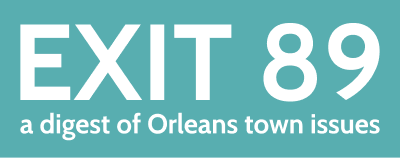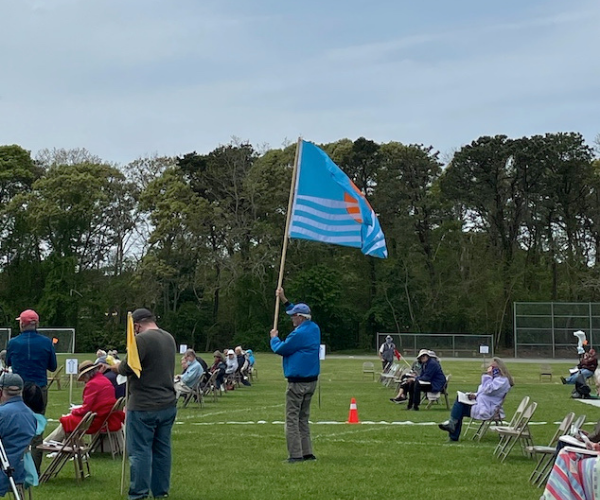Attendees were met with damp, overcast conditions at the Annual and Special Town Meeting, held at the Nauset Regional Middle School field on May 22. Residents checked-in at 10 a.m., received their electronic voting devices, and took their socially distanced seats in a thick, cool morning mist.
Lasting three-and-a-half hours, this third outdoor town meeting in the last year — and the second to use electronic voting — was fairly routine, with few controversial articles on the warrant.
Perhaps the biggest headline was the turnout. It was low! At its peak, the “crowd” totaled 272 — only 72 above the required 200 quorum. This makes us wonder: Can town governance thrive with such a small number of residents participating? (We will return to this subject later.)
Small numbers aside, the wind cleared away the fog, the sun finally came out, and the meeting had an overall hopeful feeling. After a grim and uncertain pandemic year, Orleans voters were ready to look ahead — and focus on our town’s future.
Quick Summary:
- The meeting opened with an announcement that the Orleans Water Department was acknowledged by the state for outstanding performance and top compliance in 2020. This was followed up with a reminder that our town is currently in mild drought conditions. Citizens are cautioned to conserve water.
- The warrant revisited several topics that were discussed and voted on at the Special Town Meeting in October, 2020. These included the funding of permitting, and design work, for the Nauset Estuary Dredging Project; the purchase of the Governor Prence properties; and a feasibility study for a community center. All of these passed.
- Enterprise fund budgets were approved, including fee increases for several town services — Transfer Station, Beach Parking, and Oversand Vehicle permits. (To see a list of increases, click here.)
- The housing project at the former Cape Cod Five operations center will be moving forward, along with the restoration of Mill Pond Landing and a downtown economic study.
- Voters passed an article to accept and fund MGL Ch.59, a statewide program that allows eligible senior residents to volunteer for the town in return for property tax reductions. (This failed in the Fall, but this time, accompanied by a clearer explanation, passed easily.)
- One article — to accept a town flag designed by a local artist — was indefinitely postponed in order to establish a process to determine whether the town needs a flag, and if so, to consider multiple designs.
Only two articles did not pass: a proposed amendment to a zoning bylaw prohibiting some small businesses in residential areas; and an article seeking to 1) reduce the Nauset District’s School Choice Program and 2) re-open negotiations to expand the school district to include Provincetown and Truro, requiring them to participate fully in operating costs.
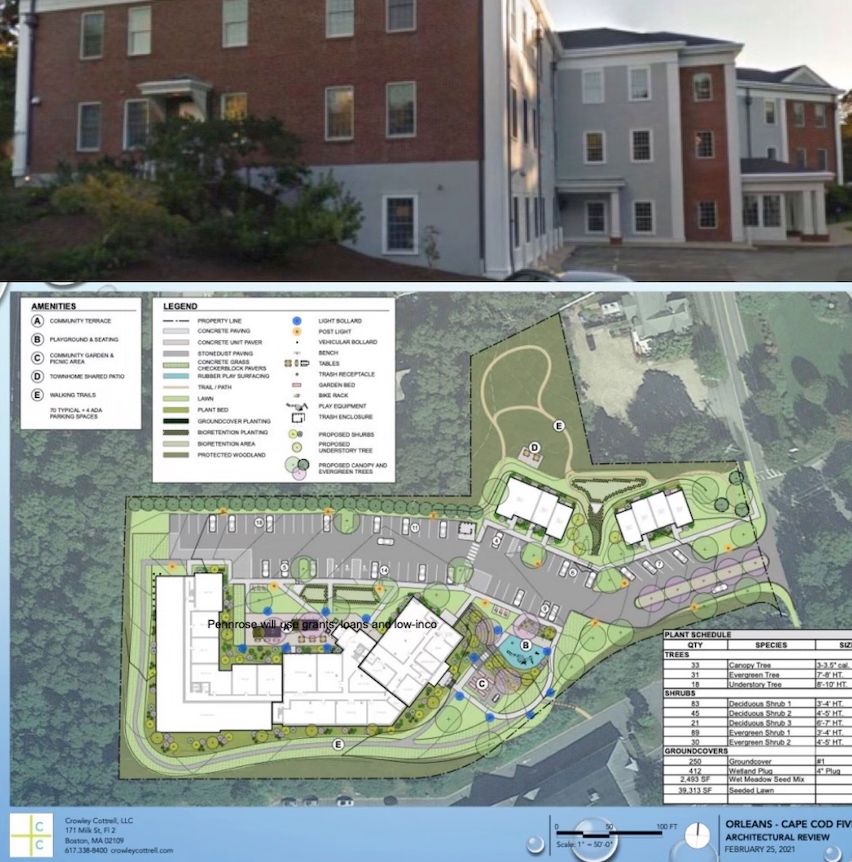
Topic A: Affordable Housing
Orleans’ dire need for affordable housing felt like Topic A of the meeting, even if just a few articles were directly related to our current housing crisis. Speakers repeatedly expressed deep concern over the rising cost of living here, particularly in light of the current pandemic-induced real-estate frenzy, which has driven housing prices further into the stratosphere.
Voters passed an article allowing the town to create 62 new housing units at the former Cape Cod Five operations center at 19 West Road. Most of these apartments (52 of them) will be permanently reserved for residents with incomes up to 80 percent of Area Median Income (AMI) –– currently about $73,000 in Orleans. The remaining units will be restricted to residents earning up to 120 percent of AMI, and classified as workforce units.
The total project cost is estimated to be $82 million. Orleans’ share is $2 million, not including money spent on past feasibility studies. Eastham will provide $100,000 in funding to the West Road development and Provincetown an additional $20,000. The discussion ran for about ten minutes and included three speakers, all supporting the project.
Voters also approved an amendment to a zoning bylaw that will reduce the minimum rental period for accessory dwellings to 90 days. The prior lease requirement, one year, was intended to offer residents more access to rentals, but prevented many would-be renters from renting at all.
EXIT 89’s next issue will be a deep dive into the subject of affordable housing, arriving in your inboxes later this summer.
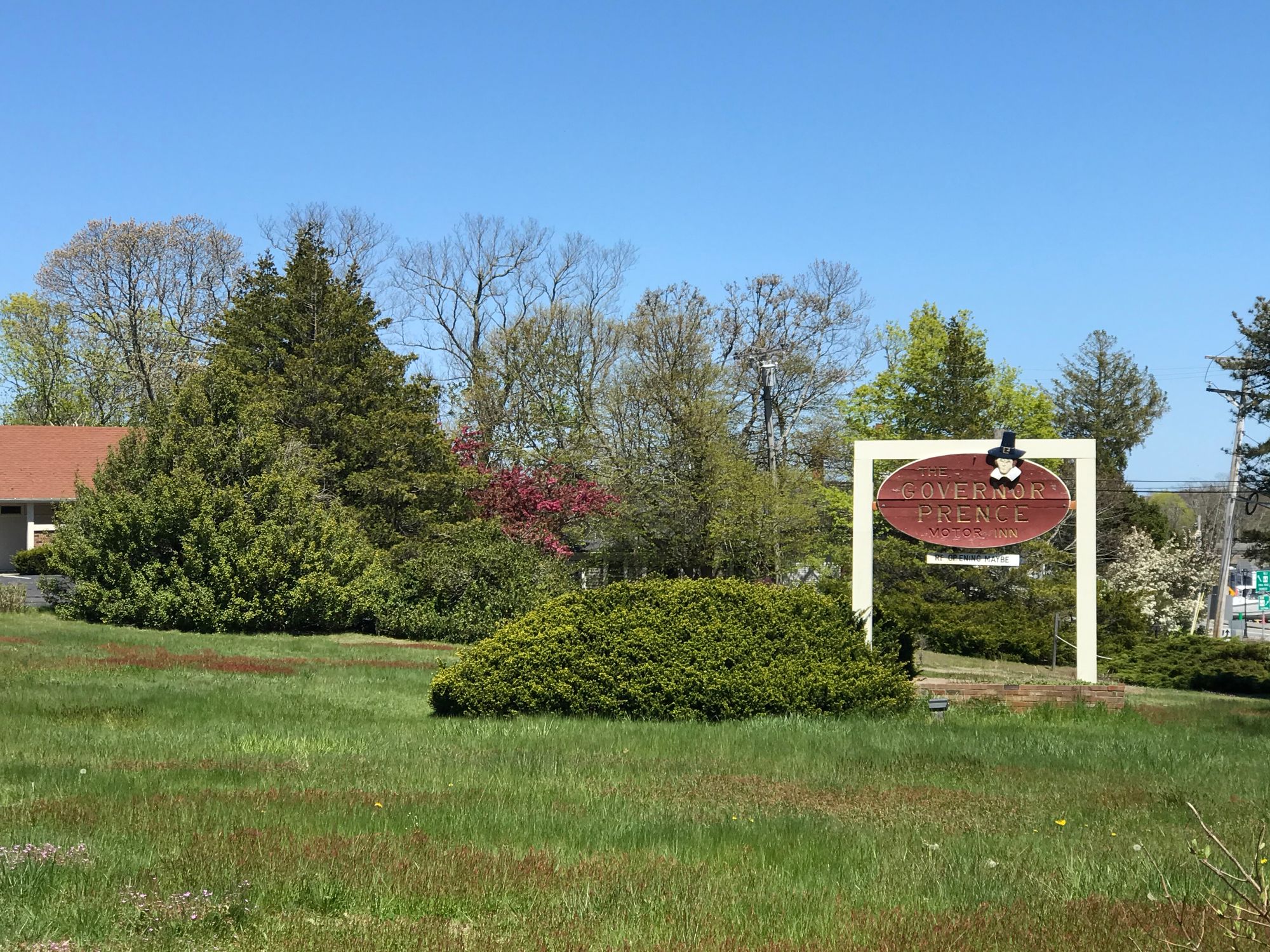
Good Ol' Gov. Prence
It was a lively discussion that ran for 21 minutes, and included six speakers, after which voters enthusiastically approved the purchase of the Governor Prence properties (246 Yes, 34 No). Select Board member Meff Runyon and Finance Committee member Elaine Baird, both of whom helped to introduce the article, emphasized that the acquisition is a way to control the destiny of the centrally-located acreage.
Purchasing the properties gives “the town of Orleans the ability to shape the long-term future of downtown,” Runyon said.
Moderator Dave Lyttle asked citizens to restrict comments to the purchase of the property, but most speakers talked about potential uses anyway — with most pressing for affordable housing.
Select Board member Mark Mathison spoke as a citizen, not as a town official, delivering an impassioned speech about the classism he faced in the 1980's, when he and his young family were renting year-round in Orleans. He remembered hearing year-round renters referred to offhandedly as, “those people.” He urged against this kind of economic bias, emphasizing that many of “those people” make our town run and deserve to live here comfortably.
Only one speaker opposed the purchase, expressing doubt that it was a good use of town funds, endorsing instead the idea of a private enterprise developing the site.
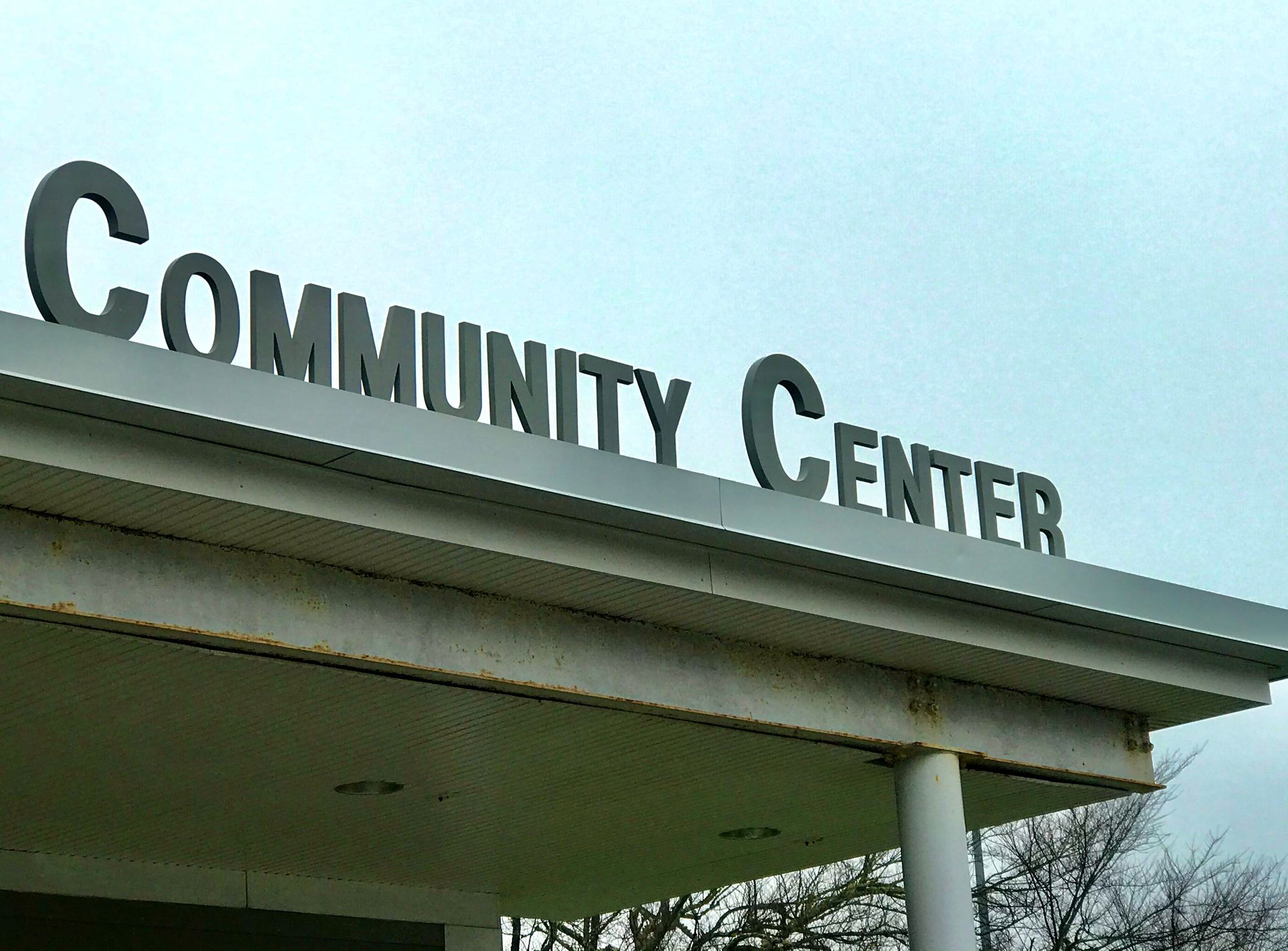
Community Center Dreams Live On
Voters showed support for other projects that would bolster the town’s sense of vitality and community. A community center feasibility study that was narrowly defeated last fall was presented again, this time with a smaller price tag –– $35,000 rather than $75,000 –– and a thorough introduction from Tracy Murphy, chair of the Orleans Recreation Advisory Committee. The article passed, by a wide margin. (234 Yes, 30 No.)
The Cape towns with community centers rely on them as hubs of activity and connectedness between all age groups. In Chatham and Harwich, these centers offer lectures, concerts, movies, exercise classes, children’s programs, and adult education classes.
A few weeks after Town Meeting, the Recreation Advisory Committee met to discuss next steps. You can watch a video of that meeting here. If you are interested in following the community center discussion, the committee and its meetings are listed here.
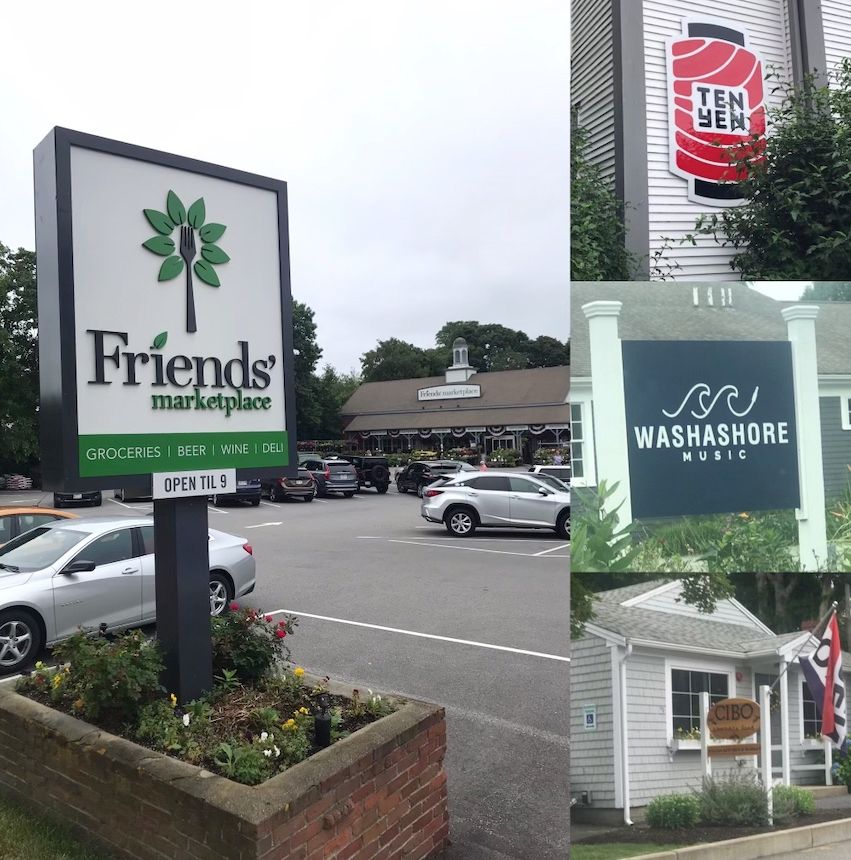
Economic Vitality — a New Study
Voters supported an article to hire a consultant to study existing economic conditions in Orleans, evaluate market trends, and recommend an overall economic strategy for the town. The last comprehensive town plan of Orleans was done in 2006 — fifteen years ago. However you feel about changes that our town may be facing, it is time for big-picture thinking. A draft approach for the consulting project can be found here.

Quorum Anxiety
Now, let’s get back to the anemic turnout. Did we mention it was low? Like, really low. Around 12:30, with an hour left to go, as attendees began trickling out and the number of voters got dangerously close to dipping below-quorum — 200 people — Moderator Dave Lyttle urged people to stay, warning that if quorum wasn’t met, “we would have to do this all again.”
(Actually, this isn't completely true. The meeting would not have been completely invalidated, but a new date for an additional meeting would have been needed, in order to finish.)
Thankfully, the number hovered just above 200. But Quorum Anxiety lingered — and raised a few questions.
Why do so few residents attend Town Meeting?
And why is the magic number 200?
According to Massachusetts law, each town establishes quorum as it sees fit. Eastham requires five percent of its voting list and Chatham requires 100 registered voters, while Yarmouth eliminated a quorum requirement in 1985.
At a recent Charter Review Committee meeting, the possibility of changing the Orleans quorum was discussed, as well as allowing non-registered voters to vote. Based on discussions with other town moderators and voters, Dave Lyttle said that reducing the quorum number is a good idea. You can view that discussion here.
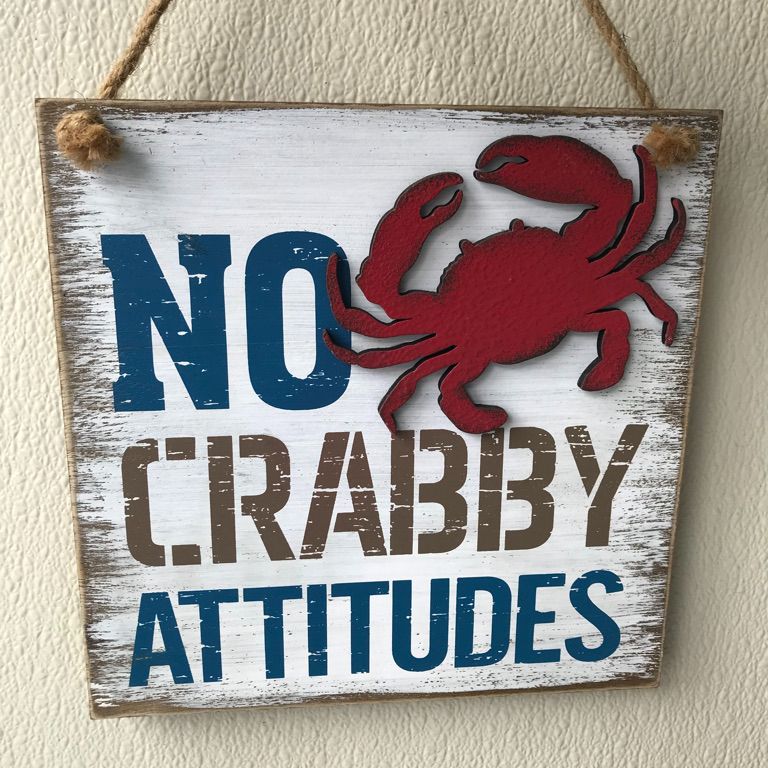
Did You Attend — or Not?
And, that’s a wrap for our Recap.
Did you attend Town Meeting?
Why, or why not? (We are a little afraid to ask.)
Could our town’s democratic processes be improved?
Let us know what's on your mind, but please try to refrain from being too crabby about it. And keep a lookout for the next two issues of EXIT 89, researched and written by our summer intern, Hanna Sweeney. In the meantime, we hope you stay healthy and enjoy the glorious, sun-soaked pandemonium of summer on Cape Cod.
This edition of EXIT 89 was researched and written by Hanna Sweeney, graduate of Nauset Regional High School and Columbia University, with assists and editing by journalists and authors Martha Sherrill and Emily Miller. Our copyeditor, Kazmira Nedeau, is on maternity leave. (Welcome, Baby Hazel!) Special thank you to Will Powers for timing all article discussions at Town Meeting. Our Advisory Board currently includes Lynn Bruneau and Elaine Baird. We are all residents of Orleans.
Learn more about EXIT 89.
